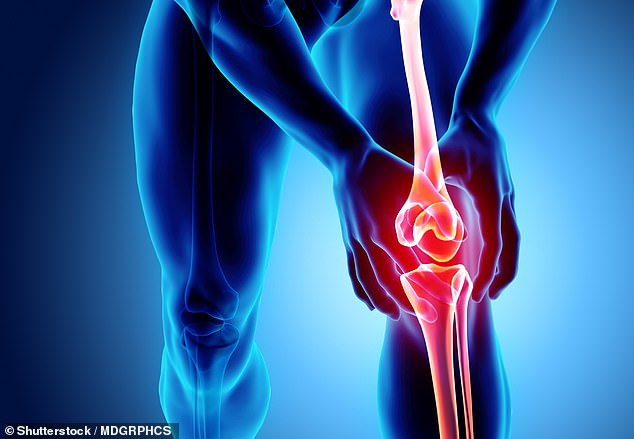Injecting tiny plastic beads into the knee joint could offer hope to patients suffering from arthritis pain, NHS research suggests.
This innovative technique requires only local anesthesia, a few hours of hospitalization and leaves few, if any, scars.
Some 40 patients with knee arthritis have undergone the treatment, called genicular artery embolisation, as part of a trial by the Royal Berkshire NHS Foundation Trust and the University of Reading.
Two-thirds reported significantly reduced swelling and more than half had improvements in pain.
Osteoarthritis, as it is medically known, affects 10 million people in the UK, according to the charity Versus Arthritis. The condition occurs when the lining of the knee, the synovium, becomes inflamed and painful.
This innovative technique requires only local anesthesia, a few hours of hospitalization and leaves little or no scarring. (File photo)

In the UK, 10 million people suffer from osteoarthritis, which causes chronic joint pain. (File photo)
This prevents the knee from working properly and causes the cartilage that cushions the ends of the bones in the joint to wear away.
The operation targets the “defective” new blood vessels that grow in the synovium, releasing chemicals that start the cycle of pain and inflammation.
Patient Tim Cooper, 67, joined the trial after being unable to sleep due to pain in his left knee, having difficulty climbing stairs and being unable to do gardening or walk. But the retired Ministry of Defence manager says undergoing the procedure in 2021 has transformed his life as he no longer has any symptoms.
The Navy veteran, from Gosport in Hampshire, has since taken up beekeeping, tending several allotments and walking adopted rescue dogs five miles a day.
Cooper says: “It’s made a huge difference in my life. I was in constant pain which was limiting my abilities. Now I’m in the same situation as I was with my other knee.”
“I’ve always loved being outdoors, I couldn’t walk or garden, doing the things that make life enjoyable. This has given me my life back.”
Professor Mark Little, a radiologist at the Royal Berkshire Hospital in Reading, started the trial after discovering that blocking blood vessels (a type of procedure called embolisation) was an effective treatment for other conditions. Embolisation is used to treat enlarged prostates, benign tumours in the uterus and liver tumours, and can stop major bleeding after accidents.
During the new knee version of the operation, the patient is injected with a local anesthetic before a needle is used to access an artery in the groin.

The operation targets the “defective” new blood vessels that grow in the synovium, releasing chemicals that start the cycle of pain and inflammation. (File photo)

Injecting tiny plastic beads into the knee joint could offer hope to patients suffering from arthritic pain. (File photo)
A narrow, hollow tube is inserted through the main blood vessel supplying the knee, guided by an X-ray machine.
Small amounts of fluid containing plastic beads, which are the size of grains of sand, are then injected through the catheter and travel to the defective blood vessels in the synovium and block blood flow.
By doing so, it stops the production of chemicals that trigger inflammation, which relieves pain and swelling. Professor Little says: “If we can stop these chemical messengers at the site where they are produced, our theory is that we can stop inflammation and perhaps stop the disease.”
“This can dramatically reduce the level of pain and possibly prevent so many people from needing knee replacements. While it doesn’t work for everyone, it offers a new, hopeful and exciting option.”
‘The procedure is best for patients with mild to moderate disease, who have not responded to standard treatment such as painkillers and physical therapy, but whose condition is not severe enough to warrant a knee replacement.
“Many of the people I see are in their fifties and sixties and live with the nightmare of chronic pain. This has a huge impact on their daily lives.”
Of the 40 patients who underwent surgery initially, nine subsequently had to undergo knee replacement. Six other patients who initially participated in the study were not suitable for the procedure.
One patient needed treatment for a blood clot in a vein after being sidelined while recovering, but there were otherwise few complications. The approach was rejected in 2021 by the National Institute for Health and Care Excellence (NICE) because health chiefs felt there was too little evidence about the long-term impact.
The Reading team is carrying out a larger study involving 110 patients, half of whom will undergo a sham procedure. They hope this new research, along with similar trials in Japan and the US, will help convince NICE to approve it.

